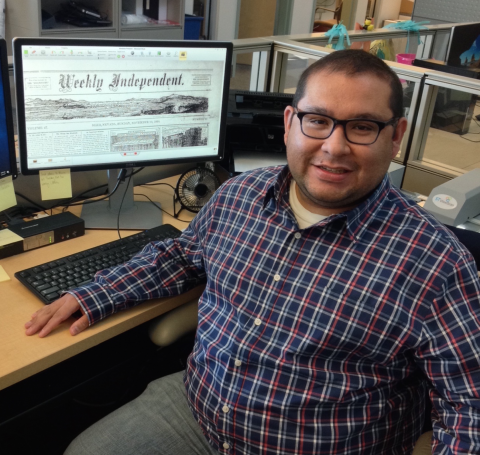
Project Technician Oscar Giurcovich with the Nevada Digital Newspaper Project (NVDNP) at UNLV
If you're curious about some of the work UNLV Libraries Special Collections staff members are doing in the archives, our Staff Highlight feature answers commonly-asked questions about their projects and perspectives. Here, Project Technician Oscar Giurcovich with the Nevada Digital Newspaper Project offers a look into his current activities.
1. What are you working on right now? How will it contribute to Nevada as a whole?
Right now I’m working on preparing our first full batch of newspapers to be sent to our vendor for digitization. This includes a collation process where we look at reels of microfilm and count the number of issues and pages, taking into account any peculiarities like missing issues or pages that were copied twice. Also, I’m working on getting our outreach and promotion efforts up and running since we now have many of the pages from the first round online. Those in Nevada interested in genealogy along with educators teaching the history of Nevada are among the groups who would benefit from having access to these historic newspapers.
2. How did you first become involved with the Nevada Digital Newspaper Project?
I first became involved with the NVDNP this past summer when I accepted a part-time position to develop a social media strategy for the project. I also created a brief video tutorial on how to find Nevada newspapers in Chronicling America, the site that hosts all of the historic state newspapers for the national project. After taking fall semester off to work at the research desk in Lied Library, I’m now back full-time and learning about the different aspects of what goes into making the newspapers available online.
3. What is the one question you are most asked about your work, or elements that fall within the scope of your job description?
A question I get asked a lot is “How much is it?” One aspect of the project that I’m really excited about is the emphasis on free access to all. Chronicling America allows users to create clippings or download whole pages of content. Other states have created tutorials and guides to help people get started with using the site, and we’re continuing to work on our own Nevada-focused content as well.
4. What is the most fascinating or positive aspect of your job? What is the most difficult aspect of your work?
In the course of my work, I get to see a run of a newspaper over the span of several years. By looking at that same newspaper over time, I get a sense of what was important to people and better understand how their future relatives would benefit from having access to them for their own research. Births, deaths, and marriages are all typically included in the newspapers. I was also surprised to see hotel arrivals published as well. As for the most difficult aspect, sometimes we find pages or entire issues of a newspaper that are missing or just not viewable, and I wonder what important information might be contained within them.
5. When you first began working on the Nevada Digital Newspaper Project, what was the one item that made your jaw drop?
The one thing that has surprised me the most so far is seeing student grades in the newspaper! Even though early Nevada consisted of small towns where I imagine most everyone knew one another, I was a bit shocked to learn that something so personal was front-page material, especially now that we’re in an age where student privacy is highly valued and we have laws that protect this information.
6. What advice would you give to someone who is interested in viewing the newspapers?
First, take a moment and put yourself in the time period you are wanting to research when deciding which words to search. Country names might have changed since, for example. Also, while the text within each page is searchable, this technology is not perfect, particularly if the page is damaged. Sometimes it’s better to browse through a run of a newspaper than rely on Chronicling America’s search feature.


